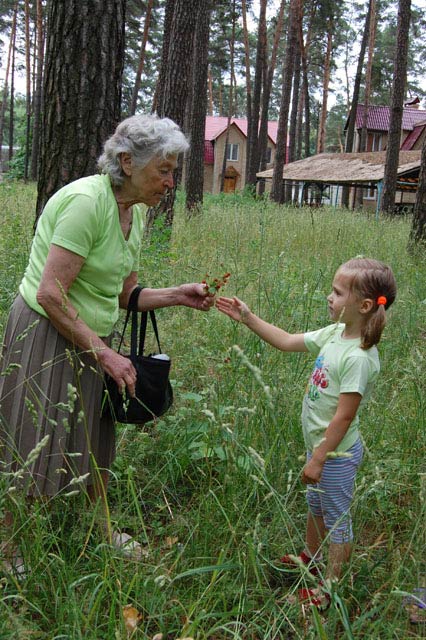Kiev (Ukraine) - On vacation with the elderly, to say that a long life is a value for all
July 1, 2011
 From June 15 to 18 some of the elderly of two institutions in Kiev, Ukraine, went on vacation with friends of the Community in a mountain resort near the city. These days were full and happy, and the elderly could do simple things, which where for all of them just a distant memory: going to the hairdresser, visiting a museum, taking a coffee in a trendy bar, go for long walks in the woods.
From June 15 to 18 some of the elderly of two institutions in Kiev, Ukraine, went on vacation with friends of the Community in a mountain resort near the city. These days were full and happy, and the elderly could do simple things, which where for all of them just a distant memory: going to the hairdresser, visiting a museum, taking a coffee in a trendy bar, go for long walks in the woods.
Many of them could not leave the institution for years.
The elderly in Ukraine face a particularly difficult condition. They are among the most vulnerable parts of population, and more than others have suffered the impoverishment of the last twenty years, between the end of the socialist system and the most recent economic crisis. The pension alone (even those linked to a good former salary) is not enough to reach even half of the month, partly because there are virtually no free services or previdence of any kind on any aspect of daily life. In particular, it is difficult to buy drugs (almost nothing is supported by the state), but also enough to eat and pay bills.
Many elderly people living at home have often supported children or relatives who are not able to support them because unemployment is high as well as alcoholism is widespread. Many resort to begging or trying to do short term jobs - that would not be appropriate at an advanced age - to sustain themselves. Many of the people to whom the Community distributes dinners on the road are elderly like this.
 Furthermore, for these frail elderly there is always the risk of losing their homes due to scams or other transactions unclear, and many are the elderly who die alone at home, having lost the ability to move and get support.
Furthermore, for these frail elderly there is always the risk of losing their homes due to scams or other transactions unclear, and many are the elderly who die alone at home, having lost the ability to move and get support.
In this context living in institutions, paradoxically, is not the worst situation, because at least it is guaranteed a minimum level of survival. But in recent years, as a result of the economic crisis, the conditions of the institutes are worse: the food is less abundant and more poor, it is increasingly difficult to get medicines, medical devices, meet the normal requirements of daily life.
To this are added the isolation, the loss of identity and therefore of hope, common to many elderly institutionalized, but aggravated by a general social impatience, even a widespread aggressivity against them.
 One worrying sign: in Kiev more and more elderly people - who would be entitled to travel free on public transport - are not allowed to board buses, with the excuse that the state does not have the money to reimburse the companies.
One worrying sign: in Kiev more and more elderly people - who would be entitled to travel free on public transport - are not allowed to board buses, with the excuse that the state does not have the money to reimburse the companies.
In this dramatic picture, the attention and care of the Community are, to many poor elderly people, a reason for hope. But they also challenged the idea that, in a time of scarce resources, the elderly are a burden on society and the affirmation of a humanism that does not accept the reduction of the person and life to his productivity and consider the old age an achievement and a value for all.

